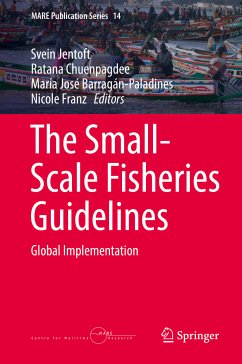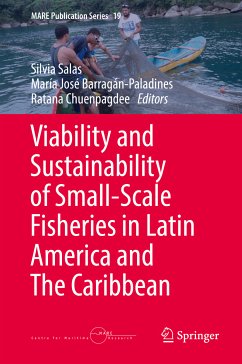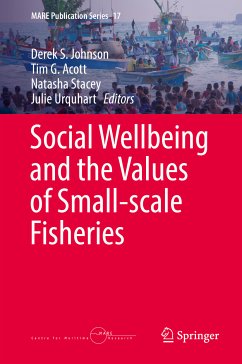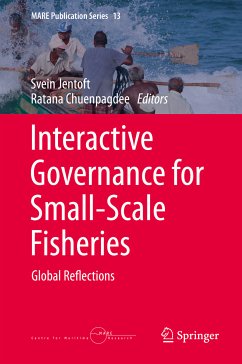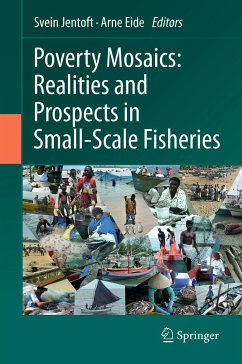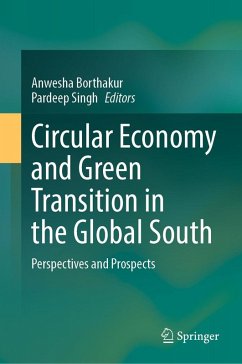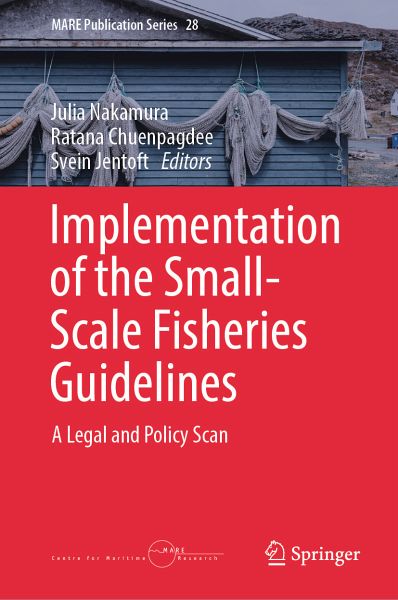
Implementation of the Small-Scale Fisheries Guidelines (eBook, PDF)
A Legal and Policy Scan
Redaktion: Nakamura, Julia; Jentoft, Svein; Chuenpagdee, Ratana

PAYBACK Punkte
56 °P sammeln!
This book provides a transdisciplinary assessment of multiple countries' legal and policy frameworks vis-à-vis the Voluntary Guidelines for Securing Sustainable Small-Scale Fisheries in the Context of Food Security and Poverty Eradication, adopted in 2014 by the Committee on Fisheries of the Food and Agriculture Organization of the United Nations. Based on an appraisal framework used to facilitate the unpacking of those frameworks, this book collects country experiences and regional perspectives on a range of cross-cutting issues underpinning the protection of the rights and the promotion of ...
This book provides a transdisciplinary assessment of multiple countries' legal and policy frameworks vis-à-vis the Voluntary Guidelines for Securing Sustainable Small-Scale Fisheries in the Context of Food Security and Poverty Eradication, adopted in 2014 by the Committee on Fisheries of the Food and Agriculture Organization of the United Nations. Based on an appraisal framework used to facilitate the unpacking of those frameworks, this book collects country experiences and regional perspectives on a range of cross-cutting issues underpinning the protection of the rights and the promotion of justice for small-scale fishers and their communities.
This book aims to be the first collection to present a systematic and in-depth assessment of existing national legal and policy frameworks vis-à-vis the SSF Guidelines. This assessment is done through the transdisciplinary and collaborative work of researchers, governments, and civil society organizations for the analysis of the cross-thematic questions, which the contributors of this book aim to address. Firstly, what are the relevant laws and policies that matter for securing rights of small-scale fishers and their communities? How are small-scale fisheries defined by national laws and policies? How are small-scale fisheries treated (i.e., specifically or generally) in these instruments? Are there specific provisions and references to small-scale fisheries or any of its associated terminologies (e.g., artisanal, subsistence, traditional, indigenous)? Secondly, how the relevant instruments address the 8 small-scale fisheries key issues outlined in that rapid appraisal study? What are the strengths and gaps in these instruments? Do they address issues that are not covered by the SSF Guidelines? Do they contribute to clarifying other legal issues that are relevant for sustainable small-scale fisheries? Finally, since the book also aims to explore the accessibility of these legal and policy instruments for those to which they matter the most (the small-scale fishers), the following questions were also considered: What challenges do they face in knowing and understanding the relevant laws and policies in place? Which tools, measures and processes are available in the countries to ensure small-scale fishers can claim for their rights? To what extent judicial courts have recognized and/or granted rights to small-scale fishers?
Chapters 11, 19 and 20 are available open access under a Creative Commons Attribution 4.0 International License via link.springer.com.
This book aims to be the first collection to present a systematic and in-depth assessment of existing national legal and policy frameworks vis-à-vis the SSF Guidelines. This assessment is done through the transdisciplinary and collaborative work of researchers, governments, and civil society organizations for the analysis of the cross-thematic questions, which the contributors of this book aim to address. Firstly, what are the relevant laws and policies that matter for securing rights of small-scale fishers and their communities? How are small-scale fisheries defined by national laws and policies? How are small-scale fisheries treated (i.e., specifically or generally) in these instruments? Are there specific provisions and references to small-scale fisheries or any of its associated terminologies (e.g., artisanal, subsistence, traditional, indigenous)? Secondly, how the relevant instruments address the 8 small-scale fisheries key issues outlined in that rapid appraisal study? What are the strengths and gaps in these instruments? Do they address issues that are not covered by the SSF Guidelines? Do they contribute to clarifying other legal issues that are relevant for sustainable small-scale fisheries? Finally, since the book also aims to explore the accessibility of these legal and policy instruments for those to which they matter the most (the small-scale fishers), the following questions were also considered: What challenges do they face in knowing and understanding the relevant laws and policies in place? Which tools, measures and processes are available in the countries to ensure small-scale fishers can claim for their rights? To what extent judicial courts have recognized and/or granted rights to small-scale fishers?
Chapters 11, 19 and 20 are available open access under a Creative Commons Attribution 4.0 International License via link.springer.com.
Dieser Download kann aus rechtlichen Gründen nur mit Rechnungsadresse in A, B, BG, CY, CZ, D, DK, EW, E, FIN, F, GR, HR, H, IRL, I, LT, L, LR, M, NL, PL, P, R, S, SLO, SK ausgeliefert werden.



